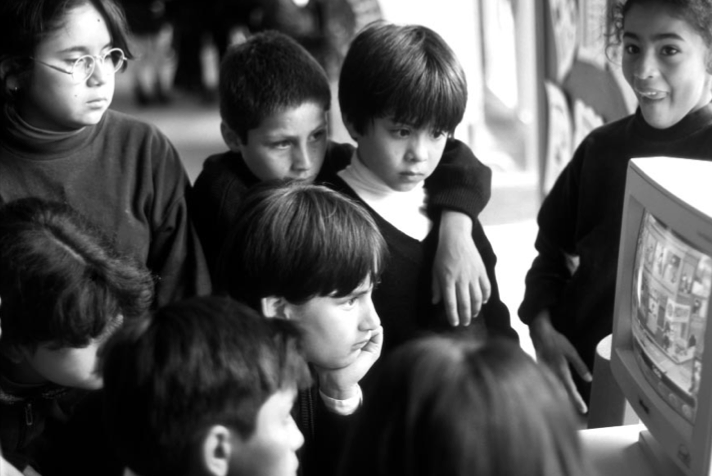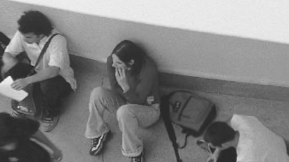Open Schools, Open Minds, Open Societies
Replacing Fear with Freedom

Children from the town of Talagante preparing their work for a science fair. Photo by Luis Weinsten.
Seventeen years of authoritarian rule leave deep scars in the people of a nation. They also leave deep marks in an education system. On a trip to Chile in June 2003 to study the effects of education policies on the quality of education, I found that the devastating effects of those 17 years were still all too visible in educational institutions. It is no wonder.
Those who in 1973 thought that the perceived threats to freedom posed by the policies of the socialist government of Salvador Allende would best be contained by eliminating civil liberties, by negating people their basic human rights, by controlling what thoughts and ideas were legitimate, targeted the very institutions designed to help develop the mind. The military who ruled Chile for almost two decades dealt with educational institutions in the very same way that authoritarian governments of the left and of the right in Latin America have done for a very long time. This exacerbated problems that Chilean schools share with schools elsewhere in Latin America schools, namely that they insufficiently prepare children to think for themselves, to value their freedom and the freedom of others, to learn at high levels and to construct strong social networks of trust at the local, national and hemispheric levels.
This authoritarian regime replaced freedoms with fear and substituted the honest search for truth with dogma. It traded respect for obedience and supplanted critical reasoning with forced acceptance of the ideas that supported a regime whose legitimacy rested in the ability to eliminate those who opposed it.
Thus, the Pinochet government closed entire university social studies departments. It replaced academic university presidents with military officers. The curriculum of elementary schools was purged of contents considered a threat to national security. The government asked school supervisors to take on functions of political vigilance and control. School administration was placed under the supervision of regime-appointed municipal authorities who could control them more effectively. Educational research would have all but disappeared were it not for the work of a handful of research centers that received financial assistance from international foundations and development agencies and some of which received protection from the Catholic Church (such as the Academia de Humanismo Cristiano or the Centro de Estudios y Desarrollo de la Educacion).
In my trip last year, I discovered that education schools, where teachers are formed, are only now slowly beginning to respond to the democratic government’s initiatives to prepare a new generation of teachers. These fledgling teachers must be ready to appreciate and develop the ability of children to think for themselves and to value their freedoms and the freedom of others. In the words of the dean of a School of Education who has played a leading role in this reform of teacher education: “When I returned to this school, after 18 years in Europe, it was hard to believe how much this school and the university had changed. The best faculty were no longer here, and I realized I would have to work with those that were left, many of whom had been hired during the dictatorship. I quickly realized the daunting challenge of trying to improve what was left here.”
In addition to talking to many educators, I looked at the curriculum to develop literacy, and at the textbooks distributed to elementary schools. The consequences of the 17-year intentional state-led destruction of the educational research and development system were all too evident. Little educational research existed in the country. Scarce support existed for the production and accumulation of knowledge to improve educational practice. The results of this deficient research knowledge base are painfully evident. The Organisation for the Economic Co-operation and Development (OECD) recently coordinated a study of basic literacy skills of 15-year-olds in 41 middle income and high-income nations. It found that among these countries, Chile has one of the largest percentages of youths who can’t identify the principal ideas presented in a text. One in five Chilean students can’t demonstrate this basic level of literacy, compared to 6% on average in the OECD.
Compounding the effects of weak institutions to prepare teachers and to generate knowledge to improve educational practice, the culture of educational decision making and management still reflects legacies of the recent authoritarian past. I talked to many local education administrators and teachers in the south of Chile who reported that their suggestions often went unheeded. They had suggested ways to improve teacher professional development workshops and ideas for responding to local educational problems. Programs of instructional improvement supported by the Ministry of Education reflected the central administrators’ limited views of the most pressing needs and their potential resolutions.
The results of these lingering educational difficulties are troubling. As is clear to the democratic leaders of contemporary Chile, the prospects for increased productivity and for deepening a democratic culture rest to a great extent in the development of the human potential of all Chileans. Sharp gaps exist in the achievement of curriculum objectives among children of different income groups, as shown by tests administered by the Ministry of Education. Children in the poorest 20% of the income distribution obtain test results in language and math that are only two thirds of the results obtained by their peers in the richest 20%. As a consequence of these different odds to learn in elementary school, children from different income groups face different odds of finishing elementary school, of beginning and completing secondary and eventually of accessing college. One in four (23%) of the students aged 15-19 in the poorest quartile drops out of school before finishing high school, in comparison to 4% of the students in the wealthiest quartile. (ECLAC, 2002), Social Panorama of Latin America,Santiago. p.112). These differences in turn are exacerbated in differences in access and completion of college.
These low educational results and severe gaps in educational opportunities for students from different income groups are problematic for a democratic state whose legitimacy rests in part on the perception that it offers equal opportunities to all citizens, a case made by Harvard President James Bryan Conant five decades ago. Newspaper articles point out that 82% of the business leaders and 45% of the political leaders are graduates of private schools, even though such schools serve only 9% of the students. These figures suggest that much of Chile’s talent is either untapped or insufficiently developed (La Tercera, June 7, p. 3).
Perhaps these deficient educational results are one of the reasons why support for democracy appears to be declining in Chile. In 2001 less than half of those polled indicated that they preferred democracy to other forms of government, (45%, down from 61% in 1997). This was lower than support for democracy in Argentina (58%), Costa Rica (71%), Peru (62%), Uruguay (79%) or Venezuela (57%). (Latinobarometro. Cited in The Economist. July 28, 2001. Vol 360. Issue 8232). In the same survey one in three persons (31%) stated that they were indifferent to a democratic vs. a non-democratic regime type. In comparison, a very small proportion of the population in Uruguay (9%) and Costa Rica (7%) said they were indifferent (Latinobarómetro, Informe de Prensa Latinobarómetro 2002). Only one in four Chileans surveyed is satisfied with how democracy works in the country. Perhaps more troubling, only 13% of those surveyed in Chile say that they believe most people can be trusted, a weak base for the legitimacy of democratic leaders.
While democratic leaders have been working to help educational institutions recover from 17 years of effort to turn Chile into a closed society: educational change takes time. As evident by their results, present reforms have insufficiently addressed ways to improve pedagogy to prepare children for democratic life.
It will take several decades to replace the faculty of schools of education and to build solid research and development institutions and traditions. New faculty and teachers who are hired to bring in new perspectives and practices have, with the exception of those returning from exile, received a good part of their education under authoritarian rule. The process of replacing an authoritarian culture with a culture of democracy will be gradual and slow.
Numerous initiatives launched during the last decade are trying to stimulate this process of cultural change. These efforts need to be sustained and deepened. Most significant is the new social consensus on the importance of education to help the nation achieve its goals of improving the living conditions of all in Chile. This consensus resulted from a skillfully managed process of social dialogue in the mid-1990s. As a result, the zone of acceptance within which education and social policy are crafted expanded substantially. Chilean society significantly increased financial resources for education and launched several initiatives to expand educational opportunity. Financial and moral initiatives increased incentives to attract qualified candidates to the teaching profession, apparently with good results as the number of candidates for university entrance who choose education has increased dramatically filling all available spaces in schools of education. New programs were developed to support reform of teacher education institutions. The school day is being gradually expanded. Other efforts include the revision of the curriculum and provision of instructional materials to all students. Several special programs support improvement of the most marginalized schools, as well as scholarship programs to support high school and college attendance of low income children. More recent initiatives support educational opportunities for Mapuche children, who have been traditionally seriously marginalized. In my June visits to schools, I was particularly impressed by the innovations introduced in the curriculum by the use of information technologies. Recognizing the importance of preparing youth to communicate with others in the hemisphere, recent policy initiatives are supporting the introduction of English instruction in public school curricula. Judging by the public reactions and controversies surrounding Bolivia’s recent claims to have access to a sea port, Chile—as the rest of the Americas—needs global education to build interhemispheric trust.

Nueva Imperial, Chile. Nov. 2000. MAPUCHE children study English—a government requirement—as well as their native language Mapudungun in the We Malal school. Children from outlying communities board at the school during the week, others are bused in daily. Behind are three oval “rucas” with traditional thatched roofs, two are used for workshops and the third for the school’s daycare center. Photo by Helen Highes.
I believe that the most valuable results of these efforts are the resulting cultural shift in Chile to allow the development of children’s capacity to think for themselves, to speak without fear and to value and respect the views of their peers. I was equally impressed by the openness and ease with which indigenous children communicated in rural schools in the south of Chile, as I was by the enthusiasm and assertiveness of students in crowded urban municipal schools. I marveled at the courage and self-confidence of future teachers in schools of education in Temuco and Concepción as they challenged reforms implemented by the Ministry of Education in a meeting with several of the most senior Ministry officials. What impressed me the most was the effervescence of the conversations among educators, the desire especially on the part of government officials, to critically reflect on what they are doing and their openness to contrarian views.
It is in this openness that lies the true difference with 17 years of fear and abuse. Chile is not a newcomer to educational reform. More than a century ago, Chile built a public education system, even sending out advisory missions to help other nations who were undertaking the same task. The democrats now governing Chile—by the authority delegated in them by the people—now face the challenge of staying the course and deepening the latest reforms to make schools into institutions to strengthen an open society. This will require that they create and nurture a new education culture where students, and teachers, can think for themselves, learn to think deeply about complex problems and learn to value their own freedom and the freedom of others to think independently. If they can do that, Chile will once again, as it did a century ago, have much to contribute to making Latin America more democratic, inclusive and open.
Spring 2004, Volume III, Number 3
Fernando Reimers is Associate Professor of Education and Director of the International Education Policy Program at the Harvard Graduate School of Education. His research focuses on policies to improve the quality and relevancy of education in Open Societies.
Related Articles
Poverty or Potential?
Teresa stops me three blocks from Nueva Imperial’s main plaza on a quiet Wednesday morning, eager to chat. She is wearing a light blue sweater and a matching blue headband glowing slightly against her dark black hair.
Editor’s Letter: Chile
I was hesitant to do an issue on Chile when I had other topics broader and richer in content. Although in a way Chile seems like an obvious choice because of the DRCLAS Regional office there, I felt there were other priorities in terms of substance.
Three Students, Three Experiences
I was extremely impressed with how successful the Chilean health system has been in improving the health of its citizens despite its limited resources. Its success, however, in many…




